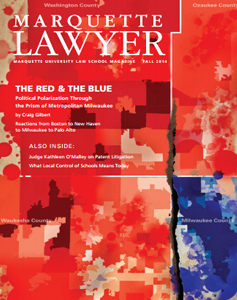Independence of Voters Yields Surprises in Law School Poll Results
It probably shouldn’t be such a surprise that independent votes would show their independence. But the Marquette Law School Poll results released Wednesday in an “On the Issues with Mike Gousha” session at Eckstein Hall clearly caught people in the room, as well as far beyond the room, by surprise. Independent voters were largely the reason why.
Two weeks ago, the poll put Republican Gov. Scott Walker ahead of Democratic challenger Mary Burke by five percentage points among likely voters. This time, the two were in such a dead heat among likely voters that the exact same number of poll respondents picked Walker and Burke (380 each). That made for a 47%-47% tie, with the scattered responses making up the remainder.
What changed? Among voters who labeled themselves independents, Walker led in the prior Marquette Law School Poll, conducted late September, by 53% to 40%. But in the new poll, conducted from Oct. 9 through 12, Burke was favored by 45% of independents and Walker by 44%. Professor Charles Franklin, director of the Marquette Law School Poll, considered that a significant shift and an indication that there were still voters out there who are persuadable by either candidate – potentially enough to decide the election.

 How did we get where we are today? Consider that a central question underlying many of the stories in the Fall 2014 Marquette Lawyer magazine, being mailed this week and now available online.
How did we get where we are today? Consider that a central question underlying many of the stories in the Fall 2014 Marquette Lawyer magazine, being mailed this week and now available online.